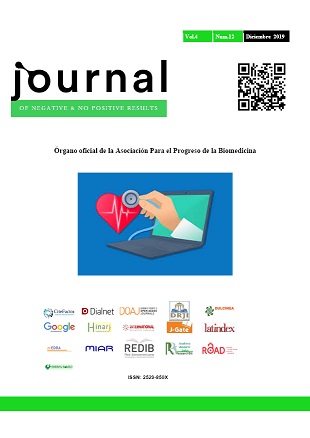Instrumental Enrichment Program (IEP), a pedagogical proposal to improve the nutritional status of schoolchildren with malnutrition in Hidalgo, Mexico
DOI:
https://doi.org/10.19230/jonnpr.3112Keywords:
IEP, school, nutritional status, preventive, constructivism-cognocitivismAbstract
Aim. Establish as a pedagogical proposal the Instrumental Enrichment Program (IEP) to improve the nutrition status of students with poor nutrition in Hidalgo.
Material and methods. A systematic review was carried out in the internet based on articles published in Crossref, JCR, Scopus, using key words. IEP-nutritional status, IEP-school, IEP-preventive.
Results. From 13 references, 5 (38.5%) were detected in Crossref metadata, 3 (23%) in PubMed and 5 (38.5%) in documents from government institutions, none of the articles detected mentioned anything about PEI and nutrition, the information detected through the review, obeys a postgraduate thesis where positive results are shown.
Conclusion. According to the literature detected and analyzed, the IEP is in fact, a program that could contribute in a preventive way in improving the nutritional status of schoolchildren. Not adopting pedagogical models based on constructivism-cognocitivism by developing countries, will continue to generate negative results in the nutritional status of schoolchildren as a public health problem.
Downloads
References
Borghi, C., Pereira, M., Torres, E., Scromeda, M. 2013. Desnutrición infantil en el Departamento de San Cosme. Rev. Posgrado de la VIa. Cátedra de Medicina. 15(203):1-6.
Poletti, O., Barrios, L. 2015. Estado de prevalencia de talla baja y factores de rieso relacionados en escolares de Corrientes (Argentina). An Esp Pediatr. 55(4):300-304.
Martínez, R., Fernández, A. 2012. Causas de la desnutrición, las consecuencias de la desnutrición. En: Modelo de análisis del impacto social y económico de la desnutrición infantil en América Latina. Primera edición. Naciones Unidas. pp. 30-43.
Cisneros, R., Díaz, J. 2012. El marco conceptual de la seguridad alimentaria nutricional. Modelo causal de la desnutrición. En: Mapa de vulnerabilidad a la desnutrición crónica infantil desde la perspectiva de la pobreza. Primera edición. Programa de las Naciones Unidas para el Desarrollo y Programa Mundial de Alimentos de las Naciones Unidas. pp. 12-14.
Márquez, H., García, V., Catlenco, M., García, E., Márquez, H., Villa, A. 2012. Clasificación y evaluación de la desnutrición en el paciente pediátrico. Medigraphic. 7(2):59-69.
Segura, J., Montes, C., Hilario, M., Asenjo, P., Baltazar, G. 2012. Desnutrición infantil: causas, consecuencias y estrategias para combatirla, escenario de la desnutrición infantil. Una visión panorámica. En: Pobreza y desnutrición infantil. Primera edición. Editorial Prisma. pp.1-51.
Varela, A., Gramacho, A., Melo, C. 2012. Programa de Enriquecimiento Instrumental (PEI): alternativa pedagógica que responde al desafío de calidad en educación. Revista Diversitas. 2(2):291-310.
Magaña, J. 2018. Impacto del Programa de Enriquecimiento Instrumental (PE) en hábitos de alimentación e IMC en Niños con Sobrepeso y Obesidad. Universidad Autónoma del Hidalgo.
Ávila, R. 2018. La educación en diabetes con enfoque intercultural desde la Teoría de la Modificabilidad Cognitiva – Programa de Enriquecimiento Instrumental (PEI). Universidad Autónoma del Hidalgo.
Orden, A., Torres, M., Luis, M., Cesani, M., Quintero, F., Oyhenart, E. 2005. Assessment of nutritional status in low-income schoolchildren in the context of nutritional transition. Arch argent pediatr. 103(3):205-211.
UNICEF, 2006. Nutrición: La base de la supervivencia y el desarrollo. En: Progreso para la infancia, un balance sobre la nutrición. Primera edición. Editorial Punto & coma. pp. 2-25.
Feuerstein, R. 1977. Mediated Learning Experience: a theoritical basis for cognitive human modifiabily durin adolescence. Research to practice in mental retardation Baltimore: University Park Press. pp. 105-115.
Feuerstein, R. 1978. The ontogeny of learning. Brain mechanisms in memory and learning. Raven Press.
Published
Issue
Section
License
All accepted originals remain the property of JONNPR. In the event of publication, the authors exclusively transfer their rights of reproduction, distribution, translation and public communication (by any sound, audiovisual or electronic medium or format) of their work. To do so, the authors shall sign a letter transferring these rights when sending the paper via the online manuscript management system.
The articles published in the journal are freely used under the terms of the Creative Commons BY NC SA license, therefore.
You are free to:
Share — copy and redistribute the material in any medium or format
Adapt — remix, transform, and build upon the material
The licensor cannot revoke these freedoms as long as you follow the license terms.
Under the following terms:
Attribution — You must give appropriate credit, provide a link to the license, and indicate if changes were made. You may do so in any reasonable manner, but not in any way that suggests the licensor endorses you or your use.
NonCommercial — You may not use the material for commercial purposes.
ShareAlike — If you remix, transform, or build upon the material, you must distribute your contributions under the same license as the original.
No additional restrictions — You may not apply legal terms or technological measures that legally restrict others from doing anything the license permits.

This work is licensed under a Creative Commons Attribution-NonCommercial-ShareAlike 4.0 International License

























